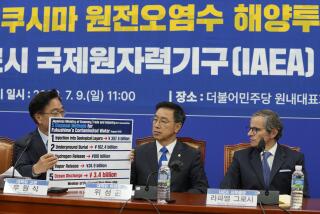Nuclear watchdog
- Share via
IT WAS AN INVITATION he couldn’t refuse. Last week, North Korea asked Mohamed ElBaradei, director of the International Atomic Energy Agency, to Pyongyang to discuss dismantling its nuclear facilities. The invitation arrived a day after the IAEA announced that Iran is moving faster than expected to enrich uranium, in defiance of the United Nations.
The IAEA, the imperfect yet indispensable nuclear watchdog agency, is imperfect in the way that all bureaucracies are imperfect; it can be slow, legalistic and equivocal. But as a keeper of the international nuclear order, it is better than the alternatives -- a conclusion even the Bush administration appears to have accepted.
The IAEA has not always enjoyed such access, or such a reputation. North Korea kicked out IAEA inspectors in December 2002, then fired up its plutonium plant and, less than five years later, claimed a successful test of a nuclear bomb. Two weeks ago, North Korea signed the precursor to what could, if all goes much better than expected, eventually turn into a nuclear disarmament deal.
Under the pact, Pyongyang must shut down its Yongbyon nuclear reactor, allow IAEA inspectors back into the country and, within 60 days, disclose all its nuclear materiel and operations. In return, Pyongyang will get a dribble of heavy fuel oil, to be followed by more oil and aid if and when it begins to dismantle its nuclear facilities.
Although it’s encouraging that Pyongyang has invited ElBaradei, the key test will be whether it discloses anything meaningful about its nuclear operations -- which U.S. officials believe include stockpiles of bomb-ready plutonium and a program to enrich uranium. More critical still will be whether the famously secretive North Koreans will allow IAEA inspectors the access that will be required to verify their claims.
ElBaradei infuriated the Bush administration before its 2003 invasion of Iraq by refusing to endorse the U.S. view that Saddam Hussein had a functioning nuclear weapons program. He was eventually proved correct, of course, and in 2005 was awarded the Nobel Peace Prize (an award that was also an obvious rebuke to President Bush).
In Iran, however, IAEA reports have tended to support U.S. claims about Tehran’s suspicious nuclear activities. Whether these reports have prompted a change in the U.S. attitude, or whether the change is the result of a larger shift in the administration’s perspective on the IAEA, is hard to tell. Whatever the reason, the agency’s renewed relevance in Washington is welcome.
All this said, ElBaradei and Bush disagree on Tehran. The U.S. generally favors a more hard-line approach, while the IAEA is more willing to negotiate. But these are policy disputes. The IAEA’s strength is more practical. It is powerless to force nations to allow its inspectors to go where they are not wanted, nor can it catch determined cheats. But it has earned credibility for honestly reporting what its inspectors find and where they are not permitted to look. For this alone, its return to North Korea will be useful.
More to Read
Sign up for Essential California
The most important California stories and recommendations in your inbox every morning.
You may occasionally receive promotional content from the Los Angeles Times.










